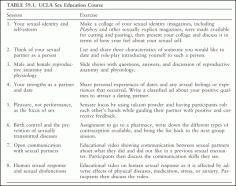Psychoeducational programs for teaching safe sex
During the past two decades, a relatively small number of sexual education programs designed for mentally disabled persons have been described in the literature. They have almost exclusively focused on safe sex, not on helping patients to learn about the process of considering and deciding whether or not to have sexual relations. Nor have these programs taught patients how to go about having mutually satisfying sex with a partner. Extant educational programs primarily have been discussion groups. Typically the discussion leader follows an outline and distributes printed handouts for patients to read and refer to in the future.
Given the problems with verbal learning and memory, “talk groups” and printed assignments go about as far as the next hour in the mind/brain processing of persons with schizophrenia. Nonetheless, programs have been presented that touch on increasing patients’ knowledge and comfort about sexual physiology, identifying and clarifying values and attitudes about sexuality, overcoming medication-related sexual dysfunctions, and basic HIV education and proper condom use. In some programs, graphics have been emphasized to compensate for the cognitive impairments of individuals with schizophrenia.
One such program, Choices: An AIDS Prevention Curriculum, is a program for high-risk, seriously mentally ill persons subject to sexual exploitation and ignorance about sexual practices. Designed to be taught to small groups in four 1-hour sessions, Choices follows a psychosocial education model guided by the emotional and attentional responsiveness of the patients. This educational package presents information and encourages discussion and learning through multimedia sources: videos and audiotapes, illustrations and photographs, printed brochures, games, role plays, quizzes, and problemsolving and question-and-answer segments. Extensive experience in outpatient, inpatient, and residential settings has shown Choices to be effective, tolerable, and enjoyable for a wide variety of patients.
Sex Education Course for Young Adults with Schizophrenia at UCLA
At the UCLA Neuropsychiatric Hospital and Behavioral Health Service, an eight-session sex education course was devised and offered by the Aftercare Clinic, a program devoted to young persons within 2 years of the onset of their schizophrenia. The aims of the course were to help participants gain more knowledge and comfort about their own sexuality and that of others; to identify and clarify their values and attitudes about sexuality; and to acquire decision-making skills regarding sexual relations. The curriculum of the course is presented in Table 59.1.
Schizophrenia and Sexuality
- Sexual activity of persons with schizophrenia
- Sexual dysfunction affecting persons with schizophrenia
- Vulnerability of this population to sexually transmitted diseases
- Psychoeducational programs for teaching safe sex
- Friendship and intimacy module
- Clinical Experience with the Friendship and Intimacy Module
- Training the trainers
- - Key Points
When the course was first proposed to the interdisciplinary mental health staff at a team meeting of the Clinic, there was a collective “gulp and gasp” at the explicitness of the material and format. The team members described discomfort at having patients discuss topics such as their previous sexual experiences, number of partners, and sexual dysfunction. In contrast, the course leaders did not discern discomfort among the patients in open discussion of these topics. As would be expected with low assertive and socially withdrawn young persons with schizophrenia, active verbal participation had to be specifically elicited during the group meetings.
 TABLE 59.1. UCLA Sex Education Course
TABLE 59.1. UCLA Sex Education Course
The exercises were an excellent means of “warming up” the group to facilitate the sharing of experiences and exploration of attitudes. None of the participants objected to participating, and none avoided answering relevant questions about their sexuality. Over the course of the seminar, the atmosphere in the group became lighter with appropriate joking, sharing of personal sexual frustrations and desires, and asking questions. With regular, biweekly ratings made routinely in this research-oriented setting, it was possible to determine that the presented material did not lead to any exacerbations of symptoms.
###
Alex Kopelowicz, M.D.a
Robert Paul Libermanb
Donald Stolar, PhDc
a Associate Professor of Psychiatry, David Geffen School of Medicine at UCLA
bProfessor of psychiatry at the University of California at Los Angeles
cDepartment of Psychiatry, University of California, Los Angeles,. Los Angeles, California
###
REFERENCES
- Assalian, P., Fraser, R. R., Tempier, R., & Cohen, D. (2000). Sexuality and quality of life of patients with schizophrenia. International Journal of Psychiatry in Clinical Practice, 4, 29–33.
- Coverdale, J. H., & Turbott, S. H. (2000). Risk behaviors for sexually transmitted infections among men with mental disorders. Psychiatric Services, 51, 234–238.
- Crenshaw, T. L., & Goldberg, J. P. (1996). Sexual pharmacology: Drugs that affect sexual functioning. New York: Norton.
- Friedman, S., & Harrison, G. (1984). Sexual histories, attitudes and behavior of schizophrenic and “normal” women. Archives of Sexual Behavior, 13, 555–567.
- Goisman, R. (2001). Choices: An educational program for AIDS prevention. Boston: MMH Reseach Corporation.